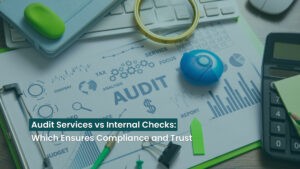When someone mentions the word audit, it rarely brings a smile. Most business owners associate it with stress, paperwork, or fear of being caught doing something wrong. But what if we told you that an external audit isn’t something to fear, but something that could save your business?
Not just save, but strengthen.
Yes, an external audit is more than a financial requirement or a statutory obligation. It’s a deep dive into your company’s inner workings. It’s a health checkup for your business, like a diagnostic test that reveals what’s working well and what’s falling apart behind the scenes.
In this blog, we’ll walk you through what an external audit really uncovers about your business health. No jargon. No sugar-coating. Just the plain truth in simple, clear words.
Why Businesses Need an External Audit?
Many small and medium business owners ask, “Do I even need an external audit if I’m not legally required to get one?” The answer? If you care about the long-term health of your business, then yes, you do.
An external audit provides independent verification of your financial statements. But that’s just the surface. The real value lies beneath. Think of it as a second pair of eyes, unbiased and professional, looking at your business with a fresh perspective.
This isn’t about catching mistakes only, though that happens. It’s about understanding how your business is performing, identifying financial blind spots, and making wise decisions based on real numbers, not guesses.
What Does an External Audit Involve?
An external audit is a review conducted by a third-party auditor who isn’t part of your company. This auditor reviews your financial statements, accounting records, and internal controls to verify that everything adds up and that your reporting accurately reflects reality.
You’ll share things like:
- Balance sheets
- Profit and loss statements
- Cash flow records
- Tax documents
- Inventory reports
- Payroll and expense sheets
But the process is more than just checking figures. Auditors often ask deep questions:
- How are your internal controls working?
- Are there any areas of risk or mismanagement?
- Is your revenue recognition compliant with accounting standards?
- Do your financials reflect the actual performance of the business?
External Audit Benefits: More Than Just Compliance
Still thinking an audit is just about ticking a box?
Let’s break down the external audit benefits that most businesses overlook:
1. Clear Financial Picture
An external audit gives you a reality check. You might think your business is doing great, but what do the numbers say? An audit will tell you the truth about your profits, debts, assets, and liabilities. That clear picture is essential for sustainable growth.
2. Building Investor and Stakeholder Trust
If you’re looking for outside investment, funding, or even a potential buyer, audited financials show that you take transparency seriously. Investors trust businesses that undergo external audits, as it reduces their risk.
3. Strengthening Internal Controls
A good auditor won’t just point out errors; they’ll also recommend how to fix them. That means better internal controls, fewer chances of fraud, and stronger checks and balances in your team’s daily work.
4. Improved Financial Decisions
With accurate insights, you’re no longer making decisions based on assumptions. You’re acting on verified data. And that’s the foundation of smart budgeting, cash flow management, and growth planning.
5. Compliance and Avoiding Penalties
Let’s not forget the obvious: Audits help ensure you’re complying with legal and tax obligations. That means fewer surprises during government inspections and less risk of fines or penalties.
Business Health Audit: It’s Not Just About the Numbers
An external audit is essentially a business health audit. And just like your doctor doesn’t only check your blood pressure, an audit isn’t limited to numbers either.
Here’s what else it uncovers:
1. Operational Weaknesses
If there are loopholes in your procurement, billing, or inventory systems, the audit will find them. These operational bottlenecks might be slowing you down or costing you more than you realize.
2. Policy Gaps and Risks
Many businesses operate without solid financial policies. An external audit checks whether your business is following proper procedures or just winging it. Weak policies open the door to fraud, errors, or unintentional tax violations.
3. Misalignment Between Vision and Reality
Maybe your company has a five-year growth plan. But are your current financials and strategies aligned with that goal? Audits help bridge the gap between where you think you’re headed and where you are.
What Audits Reveal About Your Company?
An audit tells a story. And not just any story, your company’s story. But unlike a pitch deck or a marketing brochure, this one is rooted in facts.
Here’s what most audit findings reveal:
- Hidden expenses are eating into your profits.
- Underperforming departments are draining cash flow.
- Revenue recognition issues that inflate your sales figures
- Inefficient use of assets that limit ROI
- Tax loopholes or non-compliance that might lead to trouble
This isn’t just valuable for business owners, it’s gold for potential investors or partners who want to know what they’re getting into.
Financial Audit Insights: Clarity You Didn’t Know You Needed
It’s easy to assume everything’s okay when money’s coming in and bills are being paid. But cash flow can fool you.
An external audit gives you the financial audit insights you won’t find in your monthly profit-and-loss statement:
- Are you over-reliant on one customer or vendor?
- Is your revenue seasonal or consistent?
- Are your margins sustainable or shrinking year over year?
- Are your liabilities growing faster than your assets?
These are questions every business leader must answer. The audit helps you do that, with clarity, not guesswork.
Audit Findings and Business Performance
Want to know what makes top-performing businesses stand out?
They listen to their audits.
They use audit findings to refine strategies, correct course, and strengthen foundations. And yes, there’s data to prove that businesses that embrace external audits tend to perform better in the long run.
That’s because when you know where you stand, you can plan where to go.
So, whether your audit uncovers fraud, weak financial planning, or simply outdated systems, it’s a chance to improve.
External Audit Myths That Hold Businesses Back
Let’s bust a few myths that keep businesses from embracing the audit process:
“I don’t need one unless I’m a big company.”
Truth: Even small businesses benefit from external audits. Smaller companies are often more vulnerable to financial mismanagement and fraud because they lack formal systems.
“Audits are expensive and time-consuming.”
Truth: Yes, audits come with a cost, but they also prevent significant losses. One accounting error or fraud incident could cost you more than ten audits.
“I’ll fail the audit.”
Truth: Audits aren’t exams. They’re evaluations. There’s no pass or fail, only insights that help you improve.
Who Should Conduct Your External Audit?
Not all auditors are created equal.
Look for a licensed, independent firm with experience in your industry. A good external auditor won’t just point out issues; they’ll help you understand them. And more importantly, they’ll guide you through how to fix them.
Choose someone who explains things in simple terms. Your auditor should be your partner in business health, not just a compliance officer ticking boxes.
When Should You Schedule an External Audit?
You don’t have to wait until the government tells you to do it.
Many companies now voluntarily schedule audits once a year, even if they’re not legally required. Here are some good times to consider one:
- Before applying for investment or loans
- During business restructuring or expansion
- After a significant financial loss or data breach
- When planning to sell or merge the company
- Annually, as part of healthy business practice
If your business has never had an external audit before, now is the time.
How to Prepare for an External Audit (Without the Stress)?
Yes, audits sound overwhelming. But you can make the process smoother:
- Keep your records updated regularly.
- Organize your financial statements in folders.
- Respond promptly to the auditor’s questions.
- Don’t hide mistakes, clarify them.
- Ask your auditor to explain findings in simple terms.
This process isn’t about proving perfection. It’s about building trust and improving your business health step by step.
Your Business Deserves the Truth
An external audit doesn’t just look at your numbers; it looks at your habits, your systems, and your truth.
If you’re committed to growing your business with transparency and strength, this is one of the best tools you have. It shows you the weak spots so you can fix them. It highlights your strengths so you can build on them.
No more pretending. No more guesswork.
Just clarity, insight, and direction.
External Audits in a Post-Crisis Economy
Since the pandemic and economic uncertainties, businesses have become more aware of hidden vulnerabilities. Many companies that appeared stable on paper suddenly collapsed. Why? They never truly understood their financial health until it was too late.
In such a climate, an external audit is not just helpful, it’s essential. It protects you from relying too heavily on assumptions. You can see if your cash reserves are enough to survive tough months, whether your clients are paying on time, and how long your runway truly is.
Think of it this way: when everything feels uncertain, you need something that gives you certainty. That’s what an external audit delivers: absolute, objective financial clarity.
What Happens After the Audit?
Here’s where many businesses go wrong: they see the audit as the end of the journey. But in truth, the audit is just the beginning.
What you do after the audit matters more than the audit itself. Take the findings seriously. Sit with your accountant or business consultant. Review each insight carefully. Create a step-by-step plan to act on the recommendations.
And don’t forget to communicate the results with your leadership team. Your managers and department heads should understand what was found and how they can help improve performance moving forward.
This is how you turn audit findings into tangible business performance improvements.
A Smart Business is a Transparent Business
There’s a misconception that only businesses trying to raise funds or go public should worry about transparency. That’s outdated thinking.
In today’s world, trust is currency.
Whether you’re attracting investors, winning loyal customers, or recruiting top talent, people want to engage with transparent businesses that are financially stable and responsible. A clean external audit signals that you’ve got nothing to hide and that you’re serious about running your business right.
Even if your audit shows areas to improve, the very act of going through the process shows maturity. It says, “We’re not perfect, but we care enough to improve.”
And that speaks volumes.
How Msafdar Can Help
At Msafdar, we don’t just deliver audit reports; we provide clarity. Our experienced external auditors walk with you, explain findings in plain language, and help you take action where it matters most. Whether you’re a startup or an established business, our business health audit services uncover the real story behind your numbers, so you can lead your business with confidence and control.
Ready to understand what your financials are telling you?
Let’s talk. Your business deserves it.
FAQs
- Do all companies need an external audit?
No, not all companies are legally required to have one. But even if you’re a small business, getting an audit can reveal problems you might not notice on your own.
- Will an audit expose my mistakes?
Maybe, but that’s a good thing. It helps you fix them before they become bigger issues.
- How often should I get an external audit?
Once a year is a good habit. Especially before making big business moves like expansion, funding, or mergers.
- Is an audit different from internal checks?
Yes. Someone outside your company does an external audit. It’s more objective and often more detailed.
- What if I can’t afford an audit?
Think of it as a necessary business health investment. It can help you avoid costly mistakes in the future.




